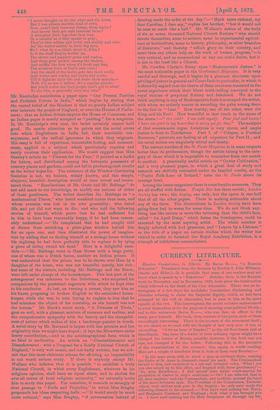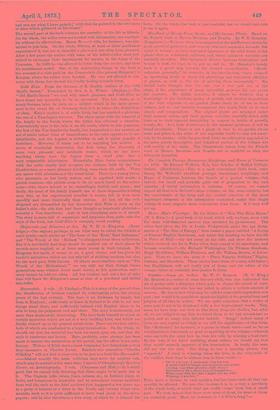CURRENT LITERATURE.
Russian Conspirators in Siberia. By Baron R—, "a Russian Dekabrist." Translated from the German by Evelyn S. John Mildmay. (Smith and Elder.)—It is possible that some of our readers may not know what is meant by a "Dekabrist." Dekaber, then, is the Russian word for December, and in December, 1825, took place the insurrection which followed on the death of the Czar Alexander. There WRS an in- terregnum of a few days, the Archduke Constantine disclaiming and Nicholas refusing to claim the Imperial dignity, which, as had been arranged by the will of ...Alexander, was to pass to him as the more capable of the two. This interregnum the secret societies endeavoured to avail themselves of for the purpose of securing some political liberty ; and to this endeavour Baron R—, who was then an officer in tho army, gave himself. His book, then, consists of two parts, each of them exceedingly interesting. There is the account of the movement itself ; we are struck as we read with the thought of how very near it was to succeeding. "0 for an hour of Dundee !" as the old Scotchman said at Sheriffmuir. One hour of a leader of even ordinary vigour might have changed the future of Russia, possibly, however, if the fruit was not ripe, not changed it for the better. Following this is the narrative of the examinations of the accused ; this, again, is worth reading. Here are a couple of anecdotes from it, both of them very Russian :— "In the same room with us stood a man in civilian's dress, wearing the Order of St. Anne in diamonds round his neck. The Commandant turned to him, and exclaimed in a sad and irritated voice, What! are you also mixed up in this affair, and leagued with these gentlemen?'— 'No, your Excellency ; I find myself here under court-martial for peculation of timber in ship's materials.'—' Oh! I am relieved, that is all, dear nephew,' said the Commandant, and cordially pressed the hand of the more fortunate man. The President of the Commission, Tatischt- schew, very seldom took part in the inquiry ; he only once made the following remark to the accused :—' You have read nothing but Tracy, and Benjamin Constant, and Bentham ; look what it has brought you to. I have read nothing but the Holy Scriptures all through my life,
and you see what I have gained ;' with that he pointed to the two rows of stars which glittered on his breast."
The second part of the book contains the narrative of the life in Siberia. An the whole, the exiles were not treated with inhumanity, nor was their lot without its alleviations. Baron R—'s wife, for instance, was per- mitted to join him. On the whole, Siberia, at least as these gentlemen experienced it, was not so dreadful a place as it has often been pictured. After a few years the author with some of his fellow-exiles were per- mitted to exchange their banishment for service in the Army of the Caucasus. In 1839 he was allowed to retire from the service, and thus his punishment ended. One of the noteworthy things in the book is the account of a visit paid by the Coaarevitch (the present Emperor) to Kurgan, where the exiles were located. Ho was not allowed to con- verse with them, but showed his kindly feeling towards them.



































 Previous page
Previous page